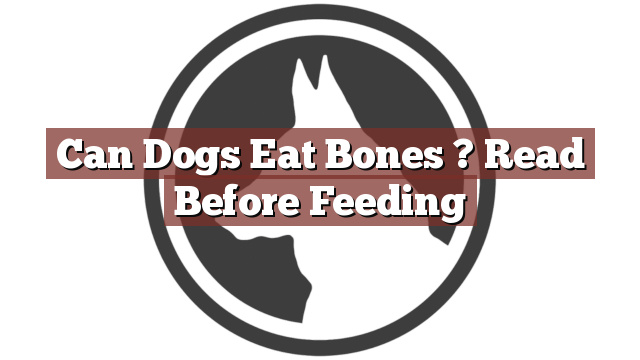Understanding Your Dog’s Dietary Needs
As a pet owner, it is essential to understand your dog’s dietary needs to ensure their health and well-being. Dogs require a balanced diet that consists of proteins, carbohydrates, fats, vitamins, and minerals. While commercial dog food is designed to meet these requirements, many pet owners wonder if they can supplement their dog’s diet with other food items, such as bones.
Can Dogs Eat Bones? Read Before Feeding
Can dogs eat bones? This is a common question among dog owners, and the answer is not as straightforward as a simple yes or no. While dogs have historically consumed bones in the wild, it is important to consider the type of bone and the potential risks involved.
The answer to whether dogs can eat bones is yes and no. Cooked bones, particularly those from poultry or other small animals, can splinter and cause serious injuries to a dog’s digestive tract. These bone fragments can puncture the stomach or intestines, leading to severe pain, internal bleeding, or even death. Therefore, it is crucial to never feed your dog cooked bones.
On the other hand, raw bones, such as raw meaty bones or recreational bones, can be safe and beneficial for dogs. Raw meaty bones provide essential nutrients, promote dental health, and offer mental stimulation for your furry friend. However, it is important to choose the right size and type of bone for your dog, as small dogs may need smaller bones to avoid any choking hazards.
Pros and Cons of Feeding Bones to Dogs
Feeding bones to dogs has its pros and cons, and it is essential to weigh them before making a decision for your pet’s health.
Pros of feeding bones:
- Dental Health: Chewing on bones can help scrape away plaque and tartar, promoting better oral hygiene.
- Mental Stimulation: Gnawing on bones provides an outlet for your dog’s natural instincts and helps alleviate boredom.
- Nutritional Value: Raw meaty bones offer essential nutrients like calcium and phosphorus, which are important for a dog’s overall health.
Cons of feeding bones:
- Choking Hazards: If bones are too small or if your dog tries to swallow them whole, it can lead to choking or blockage.
- Injuries: Improperly chosen bones or aggressive chewing can cause dental fractures, broken teeth, or damage to the gums.
- Digestive Issues: Some dogs may experience digestive upset, such as diarrhea or constipation, after consuming bones.
Conclusion: Making Informed Choices for Your Pet’s Health
In conclusion, while dogs can eat bones, it is crucial to make informed choices for your pet’s health and safety. Cooked bones should never be fed to dogs due to the risk of splintering and causing severe injuries. However, raw meaty bones and recreational bones can be a safe and beneficial addition to your dog’s diet when chosen appropriately.
To ensure your dog’s well-being, always consult with your veterinarian before introducing bones into their diet. They can provide guidance based on your dog’s individual needs, size, and chewing habits. Remember, a responsible pet owner makes informed decisions for their furry companion’s health and happiness.
Thank you for taking the time to read through our exploration of [page_title]. As every dog lover knows, our furry friends have unique dietary needs and responses, often varying from one canine to another. This is why it's paramount to approach any changes in their diet with caution and knowledge.
Before introducing any new treats or making alterations to your dog's diet based on our insights, it's crucial to consult with a veterinarian about [page_title]. Their expertise ensures that the choices you make are well-suited to your particular pet's health and well-being.
Even seemingly harmless foods can sometimes lead to allergic reactions or digestive issues, which is why monitoring your dog after introducing any new food item is essential.
The content provided here on [page_title] is crafted with care, thorough research, and a genuine love for dogs. Nevertheless, it serves as a general guideline and should not be considered a substitute for professional veterinary advice.
Always prioritize the expert insights of your veterinarian, and remember that the health and happiness of your furry companion come first.
May your journey with your pet continue to be filled with joy, love, and safe culinary adventures. Happy reading, and even happier snacking for your canine friend!

